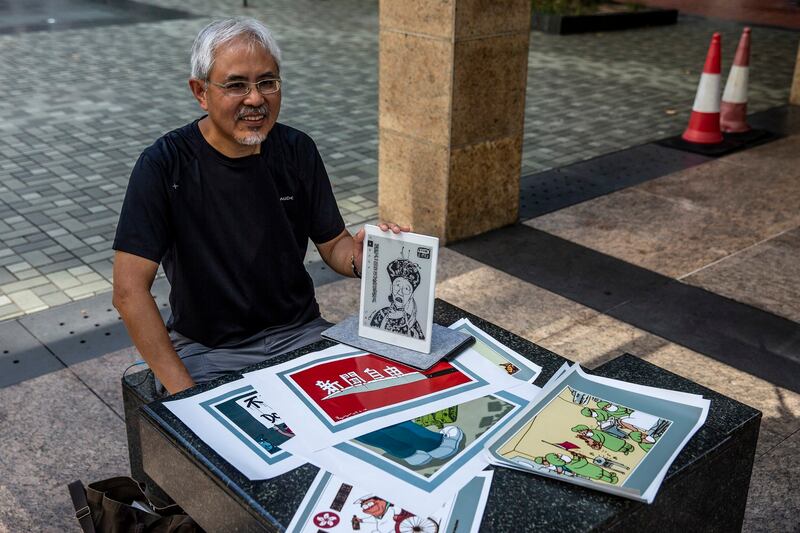A Hong Kong newspaper has axed a regular cartoon strip by political satirist Zunzi following an onslaught of public criticism from government officials.
In an announcement in a column on its A14 page of Thursday's newspaper, the Chinese-language Ming Pao said Zunzi's cartoon strip would be terminated, with just two more editions left to run.
"We would like to thank Zunzi for witnessing the changes of the past 40 years alongside us," it said, adding that the decision had been reached through an "agreement" with the cartoonist.
The newspaper union, the Ming Pao Staff Association, issued a statement on Thursday expressing "regret and a sense of helplessness" over the axing of Zunzi, as well as thanking him for his hard work over the years, including "upholding social justice and kindness."
Huang Jijun, 68, who has published work relating to the June 4, 1989, bloodshed under the pen-name Zunzi and had cartoons in every edition of the now-shuttered pro-democracy Apple Daily newspaper for 26 years, declined to comment on the reason for the move when contacted by Radio Free Asia on Thursday, saying he needed to focus on his last two comic strips.
Asked why his cartoon had been shut down, he said only: "The comic ceased publication as the result of an agreement with Ming Pao, and it's inappropriate for me to speak on behalf of the Ming Pao."
Humor as a tool
The Ming Pao's announcement came a day after the government took aim at a recent Zunzi comic strip satirizing recent changes to electoral rules for the city's District Council, which mean the government will directly appoint members of district anti-crime and fire protection committees, who are currently directly elected by local people.
"The Ming Pao today (May 9) published a cartoon strip by Zunzi that distorts and discredits the principle of appointment of members of the District Fight Crime Committee and District Fire Protection Committee by the Government," the Home and Youth Affairs Bureau said in a statement on its Facebook page.
"Recently, the Ming Pao has made some misleading remarks about the government's proposed plans for improving district governance ... a political act that tramples on ethics," it said.

Hong Kong security czar Chris Tang hit out at Zunzi last month for making fun of a police request for better surveillance equipment.
Zunzi has also taken aim at the Hong Kong government's global talent recruitment drive, quipping that "priority will be given to applicants who are accepting of harsh governance, prompting the police force to write an angry letter to the Ming Pao, while a strip depicting political censorship was criticized by cultural officials as "wantonly smearing" the authorities.
Arrests and prosecution under the national security law have followed similar public denunciations by officials or Chinese Communist Party-backed media organizations in a number of past cases.
Mak declined to comment on the axing of Zunzi when asked about it by journalists on Thursday.
"The government will humbly listen to different opinions, but we must clarify false statements or things that are inconsistent with the facts, so the public can know the truth," she said.
Crackdown on dissent
The move highlights the dwindling number of independent media organizations in Hong Kong under an ongoing crackdown on dissent.
"There are fewer and fewer free newspapers in Hong Kong, but it's not necessarily total silence," he said. "The times are changing, and the platforms that speak out are also changing."
Huang, who has previously said he plans to remain in Hong Kong, told RFA Cantonese he could "take a trip" out of town.
Ronson Chan, former chairman of the Hong Kong Journalists Association, which has also been denounced by pro-China newspapers, said the government's level of tolerance "appears to have changed."
"In the past you could say whatever you liked, and draw whatever you liked," he said. "There was once a variety of different voices in Hong Kong."
"Now, you can cross [invisible] red lines for no reason, and the risks [of operating here] are off the scale."
He said ongoing government censorship has led to a climate of fear.
"If people see that others are less willing to speak out, they will be less willing, and it will be a vicious circle," Chan said.
Translated by Luisetta Mudie. Edited by Malcolm Foster.
